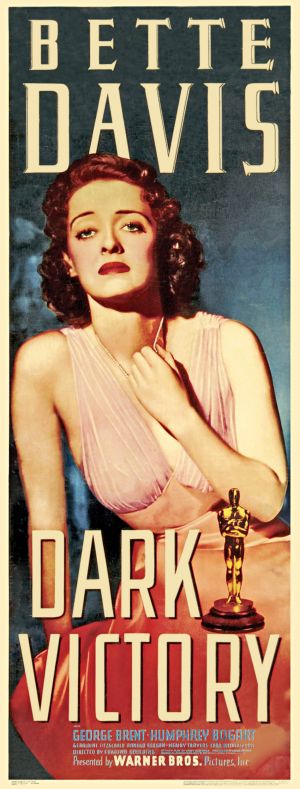 Even though the Academy Award-winning Grand Hotel (1932), the Bette Davis weepie Dark Victory (1939), and the Academy Award-nominated The Razor’s Edge (1946) are still well remembered, the man who directed them has generally been ignored by film historians — and is all but forgotten by both film audiences and film critics.
Even though the Academy Award-winning Grand Hotel (1932), the Bette Davis weepie Dark Victory (1939), and the Academy Award-nominated The Razor’s Edge (1946) are still well remembered, the man who directed them has generally been ignored by film historians — and is all but forgotten by both film audiences and film critics.
The two chief problems with the English-born Edmund Goulding (1891–1959) — those that make him "irrelevant" to most film historians (and therefore to film audiences and critics) — are the following:
Much like Jack Conway, W. S. Van Dyke, Michael Curtiz, Henry Hathaway, William Wyler, and Clarence Brown, Goulding was comfortable directing just about everything, from light comedies to heavy dramas, from female-centric melodramas to all-male actioners. In other words, unlike the revered Alfred Hitchcock, Ernst Lubitsch, John Ford, Anthony Mann, or even Ed Wood, Goulding didn’t have an immediately identifiable directorial touch. As a consequence, he can’t be considered an auteur. And as a consequence of that, he can’t be considered as anything more than a studio hired hand — a capable craftsman, perhaps, but a craftsman nevertheless, not an artist.
Goulding directed numerous movies focused on women — and we all know that "women’s pictures" are an inferior film genre to which only lesser (male) talent devoted themselves. Think of George Cukor, for instance, or Mitchell Leisen. Compounding matters, in real life both Cukor and Leisen were into men. And, for that matter, so was Goulding.
So, really, who in their right mind would take this man’s work seriously?
Well, how about anyone with a even modicum of intelligence?
Edmund Goulding’s career as a film director comprised of 37 films made during the course of more than three decades, beginning with Sun-Up and Sally, Irene and Mary at MGM in 1925 and ending with Mardi Gras at Twentieth Century-Fox in 1958. Considering the variety of genres in which Goulding worked, I’d say one would be hard pressed not to find something to like in his oeuvre.
In addition to the aforementioned Grand Hotel, which was one of the biggest box-office hits of the early 1930s, Dark Victory, and The Razor’s Edge, Goulding was the director of a series of polished star vehicles, among them Love (1927), a highly successful adaptation of Anna Karenina, with Greta Garbo and John Gilbert; The Trespasser (1929), Gloria Swanson‘s first talkie; The Devil’s Holiday (1930), which earned popular Paramount star Nancy Carroll a best actress Oscar nomination; the aviation drama The Dawn Patrol (1938), starring Errol Flynn and Basil Rathbone; and The Old Maid (1939), starring Bette Davis and Miriam Hopkins (right) in one of the best melodramas of the studios’ golden era.
Also, the first-rate melo The Great Lie (1941), with Academy Award-winner Mary Astor stealing the show from Bette Davis; the romantic The Constant Nymph (1943), with Joan Fontaine pining for Charles Boyer; the well-received Claudia (1943), starring Dorothy McGuire and Robert Young as a young married couple; Nightmare Alley (1947), a heavy drama that brought Tyrone Power some of the best notices of his career; and the multi-part comedy We’re Not Married! (1952), in which a handful of couples — including the likes of Ginger Rogers, Marilyn Monroe, Paul Douglas, Eve Arden, David Wayne, and Zsa Zsa Gabor — discover that their respective marriages are not legal.
The director himself was never nominated for an Oscar, but no less than 9 of his performers received Academy Award nominations/wins: Nancy Carroll for The Devil’s Holiday (1929-30); Gloria Swanson for The Trespasser (1929-30); Fay Bainter for White Banners (1938); Bette Davis for Dark Victory (1939); Mary Astor, supporting, won for The Great Lie (1941); Joan Fontaine for The Constant Nymph (1943); Clifton Webb and Anne Baxter, both supporting, for The Razor’s Edge (1946) — Baxter won; and Edmund Gwenn, supporting, for Mister 880 (1950).
Additionally, Goulding wrote screenplays for dozens of films, mostly during the silent and early-talkie years, including the well-regarded Tol’able David (1921), Dante’s Inferno (1924), the Best Picture Academy Award winner The Broadway Melody (1929), and several that he also directed, among them The Trespasser, The Devil’s Holiday, Riptide (1934), and The Flame Within (1935).
Now, did Goulding display an easily discernible "touch" in his films?
Apart from a certain gentility in his handling of the material, I’d have to say No.
Does that matter?
Absolutely Not.
Though hardly flawless, most of Goulding’s films that I’ve seen offer — at the very least — outstanding production values (courtesy of the studio system) and capable-to-great performances (courtesy of the director’s often masterful handling of his actors). Miriam Hopkins (in The Old Maid), Mary Astor (in The Great Lie), Joan Crawford (in Grand Hotel) — to name only three — did some of their most effective work for Goulding.
Edmund Goulding directs Wallace Beery and Joan Crawford in Grand Hotel. William H. Daniels is at the camera. Photo: Matthew Kennedy Collection.